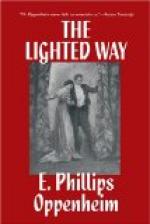For several minutes neither of them spoke a word. Fenella made a pretense at eating her luncheon. Arnold ate mechanically, his thoughts striving in vain to focus themselves upon the immediate question. It was she who ended the silence.
“What do you think you will find in those documents?”
“I have no idea,” Arnold answered. “To tell you the truth,” he went on earnestly, “I was going to ask you whether you knew of anything in his life or affairs which could explain this?”
“I am not sure that I understand you,” she said.
“It seems a strange question,” Arnold continued, “and yet it presents itself. I was going to ask you whether you knew of any reason whatsoever why Mr. Weatherley should voluntarily choose to go into hiding?”
“You have something in your mind when you ask me a question like this!” she said. “What should I know about it at all? What makes you ask me?”
Then Arnold took his courage into both hands. Her eyes seemed to be compelling him.
“What I am going to say,” he began, “may sound very foolish to you. I cannot help it. I only hope that you will not be angry with me.”
Her eyes met his steadily.
“No,” she murmured, “I will not be angry—I promise you that. It is better that I should know exactly what is in your mind. At present I do not understand.”
His manner acquired a new earnestness. He forgot his luncheon and leaned across the table towards her.
“Fenella,” he said, “try and consider how these things of which I am going to speak must have presented themselves to me. Try, if you can, and put yourself in my position for a few minutes. Before that evening on which Mr. Weatherley asked me to come to your house, nothing in the shape of an adventure had ever happened to me. I had had my troubles, but they were ordinary ones, such as the whole world knows of. From the day when I went to school to the day when I had to leave college hurriedly, lost my father, and came up to London a pauper, life with me was entirely an obvious affair. From the night I crossed the threshold of your house, things were different.”
There was a cloud upon her face. She began to drum with her slim forefingers upon the tablecloth.
“I think that I would rather you did not go on,” she said.
He shook his head.
“I must,” he declared, fervently. “These things have been in my mind too long. It is not well for our friendship that I should have such thoughts and leave them unuttered. On that very first evening—the first time I ever saw you—you behaved, in a way, strangely. You took me into your little sitting-room and I could see that you were in trouble. Something was happening, or you were afraid that it was going to happen. You sent me to the window to look out and see if any one were watching the house. You remember all that?”
“Yes,” she murmured, “I remember.”




